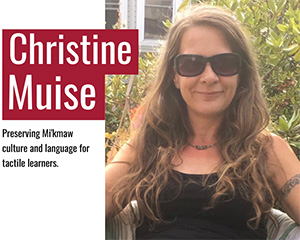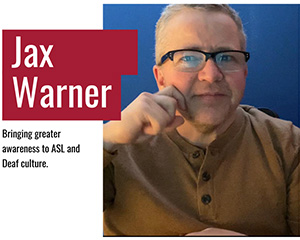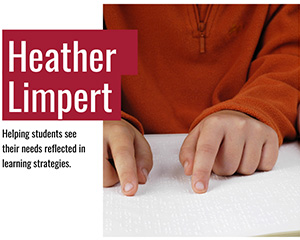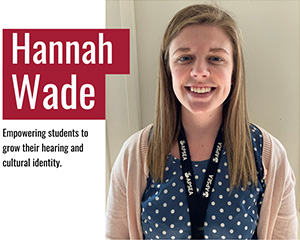APSEA (Atlantic Provinces Special Education Authority) congratulates the 2022 Nova Scotia Education Week Awards recipients. This year’s theme Cultural Responsiveness- Meeting students where they are is how we prioritize ensuring everyone in our school communities feels a sense of belonging. We thank our four honourees for leading the way and integrating cultural responsiveness into their daily work. Our winners are:
 Christine Muise works at APSEA transcribing student materials into accessible formats. In 2021, Christine was deeply moved by media reports about the discovery of unmarked graves on the grounds of former residential schools. She decided to find a way to actively stand against the violent injustice committed against the Indigenous children buried in those graves.
Christine Muise works at APSEA transcribing student materials into accessible formats. In 2021, Christine was deeply moved by media reports about the discovery of unmarked graves on the grounds of former residential schools. She decided to find a way to actively stand against the violent injustice committed against the Indigenous children buried in those graves.
Christine learned that because there is currently no Indigenous braille code for the Mi’kmaw Language, Mi’kmaq who are braille readers have no means of reading material in their traditional language. She strongly felt that as part of preserving Indigenous culture and language, individuals who read tactually must have a way to do so in their traditional language. In response, she began taking steps toward the development of an Indigenous Braille Code. She contacted representatives in First Nations leadership, the Federal government, and Braille agencies to confirm the need for such a code. She continues to connect with stakeholders working with them towards the development of an Indigenous Braille Code.
 Jax Warner works passionately to share information on American Sign Language (ASL) and Deaf culture with colleagues, families, students, and school staff. In his role as an APSEA ASL Specialist, Jax is part of many interdisciplinary teams and gives endless hours to bringing an awareness of ASL and Deaf culture to numerous projects including his own caseload, APSEA Virtual Learning Series, APSEA Connect, and community partner collaborations. Always working from a professional perspective, Jax shares the value of ASL and Deaf culture with Deaf and hearing individuals alike and supports parents in planning communication pathways for their children. He is always respectful of choice and meets families where they are in supporting children and youth.
Jax Warner works passionately to share information on American Sign Language (ASL) and Deaf culture with colleagues, families, students, and school staff. In his role as an APSEA ASL Specialist, Jax is part of many interdisciplinary teams and gives endless hours to bringing an awareness of ASL and Deaf culture to numerous projects including his own caseload, APSEA Virtual Learning Series, APSEA Connect, and community partner collaborations. Always working from a professional perspective, Jax shares the value of ASL and Deaf culture with Deaf and hearing individuals alike and supports parents in planning communication pathways for their children. He is always respectful of choice and meets families where they are in supporting children and youth.
 Heather Limpert supports an accessible environment for children and youth who are blind or visually impaired by offering a “virtual circle time group”. Through the APSEA Virtual Learning Series, online programming designed to provide students with targeted content and learning, Heather went above and beyond to create a program where all participants see their needs reflected in the activities, expectations, and outcomes. Heather has built relationships with the learners, school teams, and families to ensure that all participants can reach their full potential in a caring and meaningful environment. Her enthusiasm and dedication to meet students where they are is commendable.
Heather Limpert supports an accessible environment for children and youth who are blind or visually impaired by offering a “virtual circle time group”. Through the APSEA Virtual Learning Series, online programming designed to provide students with targeted content and learning, Heather went above and beyond to create a program where all participants see their needs reflected in the activities, expectations, and outcomes. Heather has built relationships with the learners, school teams, and families to ensure that all participants can reach their full potential in a caring and meaningful environment. Her enthusiasm and dedication to meet students where they are is commendable.
 Hannah Wade brings a great deal of cultural sensitivity to her work with students who are Deaf and hard of hearing. With Deaf and hearing cultures acknowledged as being very different, it is critical for teachers to understand and respect students’ self-identity. As a person with both lived and professional experience, she is able to relate to their experiences and use her own to guide them towards developing their identities as part of hearing and Deaf communities. Hannah demonstrates the utmost respect for students’ right to choose their own hearing and cultural identity, while being a positive role model for students, families and school teams through her work with her caseload and the APSEA Virtual Learning Series, in which she supports students from across Atlantic Canada.
Hannah Wade brings a great deal of cultural sensitivity to her work with students who are Deaf and hard of hearing. With Deaf and hearing cultures acknowledged as being very different, it is critical for teachers to understand and respect students’ self-identity. As a person with both lived and professional experience, she is able to relate to their experiences and use her own to guide them towards developing their identities as part of hearing and Deaf communities. Hannah demonstrates the utmost respect for students’ right to choose their own hearing and cultural identity, while being a positive role model for students, families and school teams through her work with her caseload and the APSEA Virtual Learning Series, in which she supports students from across Atlantic Canada.